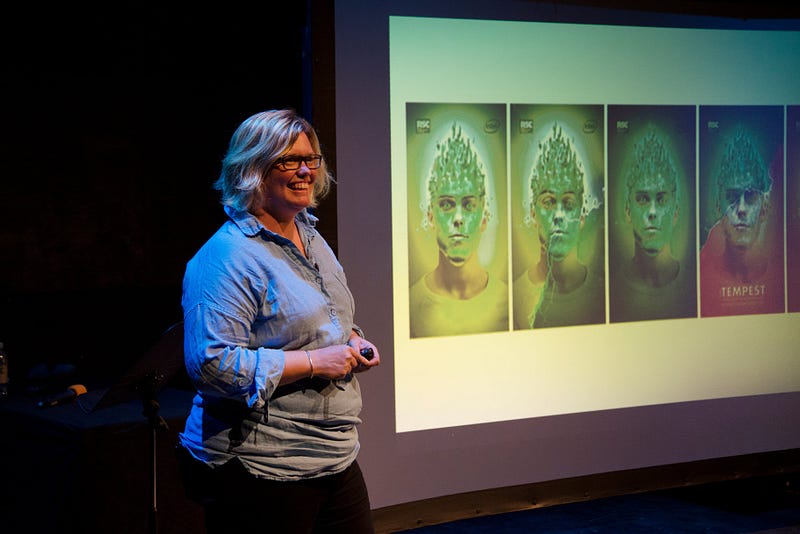Thinking through practice, (really) extreme immersion, Shakespeare re-imagined, VR podcasting, and challenging biased algorithms
Jessica Brillhart
Jessica Brillhart thinks deeply about immersive media and she knows what she’s talking about, because she experiments with everything she writes and talks about in her story-making practice. She has her own immersive studio, Vrai Pictures; has made beautiful VR projects such as Beethoven’s Fifth, and has just released a new spatial audio platform called Traverse. Previously at Google, she helped develop Google Jump. Her Medium series on the language of VR was hugely influential for those of us trying to figure out how to tell stories in this emerging medium. Jessica has traveled to South Africa twice to work with me in my Electric South capacity, providing excellent mentorship and support to African VR creators. She’s giving the Convergence Keynote at SXSW so if you’re headed to Austin look out for her there!

Blast Theory
Founded in 1991 and led by artists Matt Adams, Ju Row Farr, and Nick Tandavanitj, Blast Theory creates interactive and immersive experiences centered on audiences. Their work takes place in virtual and physical spaces— from pubs, canals, and abandoned warehouses to libraries, museums and apps. In Operation Black Antler you enter the murky world of undercover surveillance, where you must meet, get to know, and ultimately try to win the trust of someone whose political and moral views may be the polar opposite of your own. In Karen, you interact with a life coach via an app, an experience that gets decidedly weirder the longer you do it. One project, aptly named Kidnap, involves kidnapping people:
Entrants paid £10 to enter a lottery in the hope of being kidnapped. Ten finalists were chosen at random and put under surveillance. Two winners — Debra Burgess, a 27-year-old Australian working as a temp, and Russell Ward, a 19-year old from Southend working in a 24-hour convenience store — were snatched in broad daylight and taken to a secret location for 48 hours. The process was broadcast live onto the internet. Online visitors were able to control the video camera inside the safe house and communicate live with the kidnappers.

Sarah Ellis
Sarah Ellis is Director of Digital Development at the Royal Shakespeare Company (RSC). Under her excellent leadership the RSC is part of the Audience of the Future government initiative, exploring “the possibilities of virtual reality (VR), augmented reality (AR), mixed reality (MR), and the opportunities of real-time immersive performance that are connected across multiple platforms, creating opportunities for the UK cultural sector to change the way audiences experience live performance by making it more immersive.” Sarah is one of those people who brings Magic Leap and Shakespeare together, and it all just kinda makes sense. She’s also a very inspiring public speaker.

Kent Bye
Kent Bye is host of the Voices of VR podcast, a really thoughtful podcast series that goes beyond the cycles of hype and despair that often surround the medium. You’ll often see him at VR events armed with his microphone. He has conducted over 1,000 interviews since 2014 and has branched off into new podcasts, including Voices of AI. We often worry that we are not creating an adequate history of the present when it comes to these evolving mediums, so these audio conversations are a real gift, a documentation of things we may soon forget as we reach for the next shiny storytelling object.

Joy Buolamwini
Joy Buolamwini founded the Algorithmic Justice League to fight harmful bias in artificial intelligence. Her TED talk on algorithmic bias has been viewed over a million times. She somehow also manages to find time to work on her PhD at MIT. She wrote an opinion piece for The New York Times about what happens when robots don’t see dark skin in facial recognition:
Everyday people should support lawmakers, activists, and public-interest technologists in demanding transparency, equity, and accountability in the use of artificial intelligence that governs our lives. Facial recognition is increasingly penetrating our lives, but there is still time to prevent it from worsening social inequalities. To do that, we must face the coded gaze.
Recently she was part of a brilliant response to the recent IBM “Dear Tech” ad which neglected to focus on the role of tech companies.
Immerse is an initiative of the MIT Open DocLab and The Fledgling Fund, and it receives funding from Just Films | Ford Foundation and the MacArthur Foundation. IFP is our fiscal sponsor. Learn more here. We are committed to exploring and showcasing media projects that push the boundaries of media and tackle issues of social justice — and rely on friends like you to sustain ourselves and grow. Join us by making a gift today.